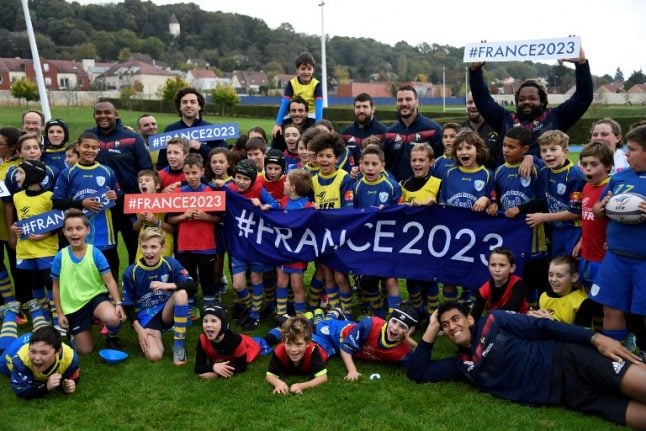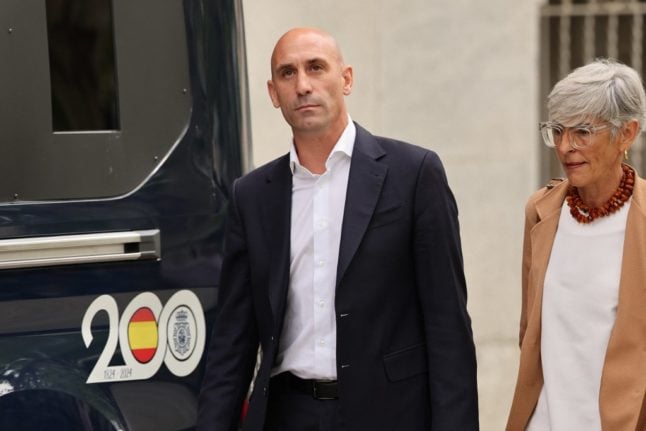SPORT
France wins bid to host Rugby World Cup in 2023
France has won the right to stage the 2023 World Cup, it was announced Wednesday, despite finishing behind rival bidders South Africa in an evaluation report.
Published: 15 November 2017 15:45 CET

Photo: AFP
The report, widely criticised by both France and Ireland, the third bidding country, was not binding on the remaining members of the World Rugby Council, who voted in London.
World Rugby chiefs denied they had been “humiliated” by France winning the right to stage the 2023 World Cup on Wednesday despite finishing behind South Africa.
Wednesday's decision, announced by World Rugby chairman Bill Beaumont, means France will be staging a World Cup for the second time, having previously hosted the 2007 edition. The tournament also comes a year before France hosts the 2024 Olympic Games.
In order to be chosen, the successful bidder needed a simple majority of 20 out of the 39 remaining votes — France, Ireland and South Africa were barred from participating in the ballot.
The first round finished with France on 18 votes, 1995 hosts South Africa on 13 and Ireland, who've yet to be the main hosts of a World Cup, eight.
With Ireland dropping out, France beat South Africa by 24 votes to 15 in the second round.
“We've been fortunate to have three great bids,” said Beaumont after announcing Wednesday's decision.
“Certainly delighted for France. It will be a really exciting tournament,” the former England captain added.
Last month World Rugby published an evaluation report which said South Africa should be chosen given it had an overall rating of 78.97, compared with 75.88 for France and 72.25 for Ireland, across a range of criteria.
The report aimed to provide objective standards for a process previously dogged by allegations of backroom 'horse-trading' between countries.
But it immediately came under attack from both France and Ireland, who were rebuked by World Rugby chiefs, including Beaumont, as they reaffirmed their support for its findings.
Bernard Laporte, the president of the French Rugby Federation, was especially damning, telling AFP in an interview last month: “On security, we have the same number of points even though there are 52 murders a day in South
Africa. It's crazy.”
But Laporte, a former coach of the France national side and a former French government minister, was in more conciliatory mood on Wednesday, saying: “I'm proud France was chosen. We had a solid dossier like our two rivals. We will do our best.”
South African 'desolation'
South Africa Rugby chief executive Jurie Roux had warned that going against the report's outcome would “laugh in the face of transparency and process”.
That led to accusations of arrogance but South Africa officials made no attempt to hide their “bitter disappointment” and “desolation” with Wednesday's vote.
SA Rugby president Mark Alexander added in a statement: “We did everything in our power to bring the tournament to South Africa and we expected to have that right confirmed today.”
Taking a swipe at the vote, he said the “view of the experts” had been overturned by World Rugby Council members “who may have had other factors to take into account”. Roux complained that the process gone “opaque” over the last two weeks.
Beaumont denied World Rugby had been “humiliated” as a result of having the report's recommendation rejected.
“Just because it went to France doesn't mean there is humiliation,” he said.
“I was involved in a bid (for 2007) with England that got three votes many years ago — two of them were from England — so I can understand the disappointment.”
Beaumont, the captain of the 1980 British and Irish Lions beaten in a Test series in South Africa, added: “Like a game of rugby, some you win, some you lose.”
The 2023 tournament, the 10th Rugby World Cup, will coincide with what has long been regarded as the 200th anniversary of the sport when William Webb Ellis picked up a ball and ran with it at Rugby School in England.
It will follow the 2019 edition in Japan and, for the second time in a row, means a Rugby World Cup will take place a year before the same country stages the Olympics, with Tokyo hosting the 2020 Games.
England staged the most recent World Cup in 2015 which saw New Zealand win a second straight title after they triumphed on home soil in 2011.
Url copied to clipboard!


 Please whitelist us to continue reading.
Please whitelist us to continue reading.